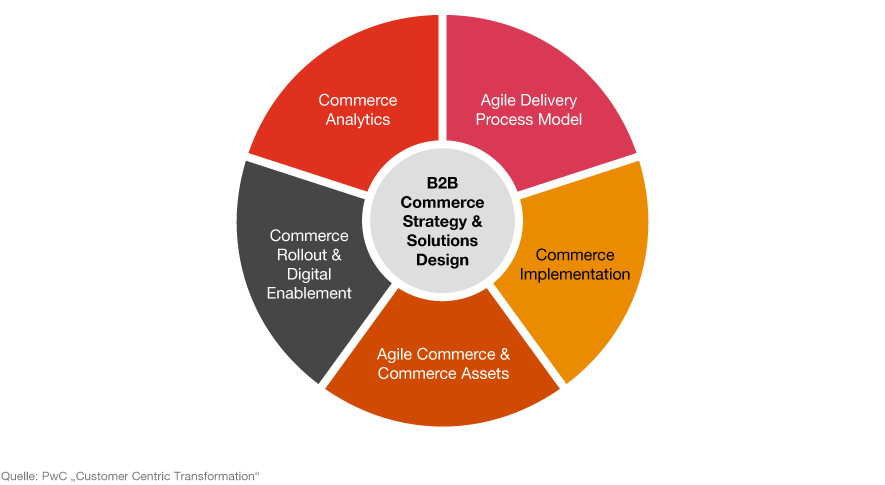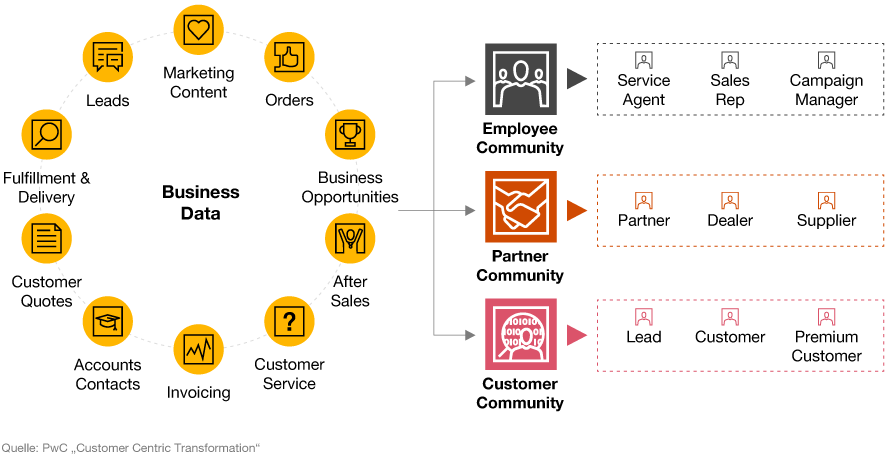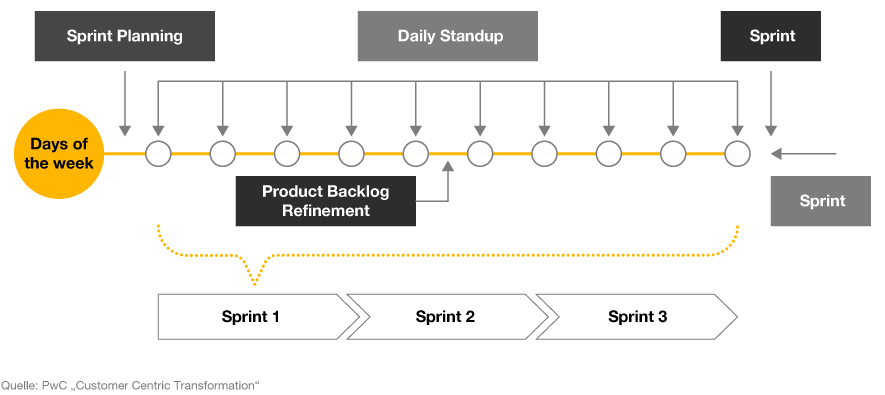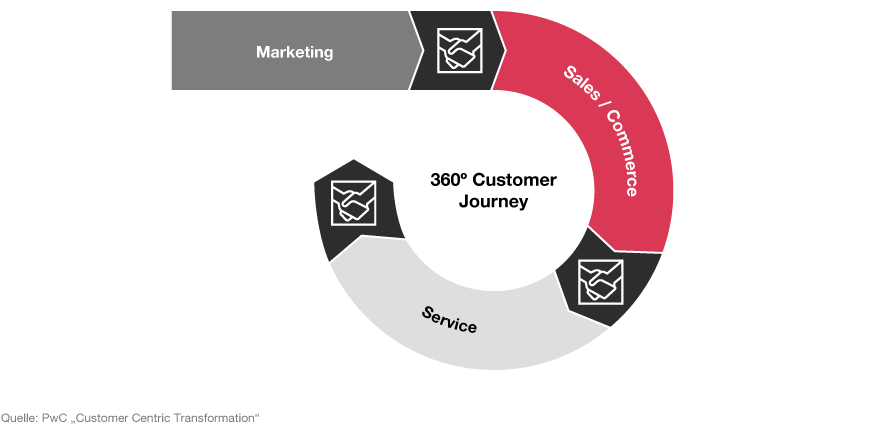
Recognising your market’s retail challenges and finding solutions
The retail sector faces multiple challenges. There have never been more sales channels, customer trends change constantly, and expectations are rising. For sales and marketing, it's essential to create seamless, personalised omnichannel experiences backed by solid digital commerce and sales strategies. All processes should be automated, efficient, and seamless, from product presentation and purchasing to customer service. And above all, always tailored to your customers’ individual needs.
PwC supports you in mastering your e-commerce challenges. Our approach to increasing your online sales includes:
- Establishing a globally aligned sales and distributor organisation that drives high performance and growth.
- Harmonisation of workflows, technologies, and processes for a truly customer-centric organisation
- Guidance selecting the appropriate e-commerce technologies
Ultimately, your customers will enjoy better shopping experiences that bind them to your brand.
BXT: our proven formula for your sales organisation’s success
Why choose PwC as your digital commerce advisor? The answer is BXT – our tried and tested approach for successful e-commerce.
BXT stands for:
- B: Business success – with online and offline sales strategies, globally standardised processes and clever target operating models.
- X: Experience – for the perfect customer journey, thanks in part to our design thinking expertise
- T: Technology expertise – including selecting and coordinating system landscapes that perfectly match your requirements.
We can support you in digitising all your relevant sales channels and integrating your digital commerce strategies into your overall sales strategy. Create a digital shopping experience for your customer base and differentiate yourself from the competition by personalising your sales activities with the appropriate CRM data. A data-driven, 360-degree view of your consumers gives optimal transparency.
Drive sales with slick digital commerce
We can help you optimise your sales teams’ valuable time by simplifying your opportunity processes, like automating quotes, for example. And we can help strategically develop your omnichannel web store by integrating various systems, such as CRM (e.g., Salesforce) and ERP with marketing data in a single ‘Experience Cloud’ – for excellent customer experiences.
How do we drive your sales organisation’s digital transformation and e-commerce processes? With holistic support, from strategy and implementation to day-to-day procedures, such as customer service.
The e-commerce challenges for B2B companies
The demand for digital purchasing in the B2B sector has risen sharply in recent years. The market researchers at Forrester found that more than 30% of B2B buyers’ first purchase is through a digital channel. Forrester predicts that B2B sales in the U.S. will grow to around $1.8 trillion by 2023. The coronavirus crisis further reinforces this trend in online sales.
But while the B2C commerce space has come of age, B2B commerce still has some catching up to do, not least because of operational and supply chain complexities. B2B selling comprises complex building blocks that should work together seamlessly. Customer experiences in the B2C sector also set the bar and shape expectations in B2B e-commerce.
Our e-commerce services for B2B selling
- Our B2B Framework
- B2B Commerce Assessment
- Digital Experience Portal
- The right platform strategy
- Headless commerce for more agility
- Agile methods for rapid sales success
- Digital technology expertise
Our B2B Framework
Increasingly, one aspect that characterises B2C and B2B commerce is the headless approach. Application programming interfaces (APIs) separate the front end (the ‘head’, where users interact) from the back end. Headless commerce enables companies to develop and expand standalone front-end applications independently of the back end.
Regarding business models, a platform strategy is vital. Each organisation’s specific circumstance, needs and drivers help shape the appropriate model. Platform strategy refers to a market entry strategy based on participants mutually benefiting from each other’s presence through economies of scale.
We offer a framework from which you can select specific building blocks – tailored to your needs and your current situation. In this way, you can either build B2B commerce from scratch – from strategy to implementation – or take your existing digital sales to the next level. In the end, you offer an optimal customer journey.

B2B Commerce Assessment
Our B2B Commerce Assessment is a comprehensive analysis and optimisation of your organisation’s digital maturity. To do this, we first record the current situation of your B2B Commerce, whereby six key topics guide us. We then determine the desired target maturity level. Together with you, we derive the necessary actions and discuss the concrete implementation. The basis for this is our agile B2B Commerce Framework.
Digital Experience Portal
Since COVID-19, the consumption patterns and purchasing expectations of both customers and suppliers have undergone a radical change. Consumers are increasingly shifting their purchasing decisions towards digital channels: Companies' challenge at this point lies in synchronizing across multiple channels and customers touchpoints to provide them with a seamless customer experience through an interconnected portal.
PwC supports your organization by implementing a “Digital Experience Portal” to create a holistic platform solution transforming existing processes, personas and data into a 360-degree customer view. As a result, your organization will improve its internal and external network collaboration in an efficient and cost-effective way.

The right platform strategy
By a platform, we mean the single- or multi-sided business model where participants on one side benefit from the presence of other players. For example, in Uber, passengers’ benefit from many drivers, while drivers benefit from a higher number of passengers.
Above all, an effective platform strategy should answer one of the most critical questions: how do companies increase their attractiveness to potential future participants while still building a platform? Once you have the answer, you should establish rules of the game that apply to both platform participants and operators. For example, does the operator actively participate in platform activities? Or do they withdraw, acting mainly as administrators and earning from the multi-sided business model?
Ultimately, it is a matter of ensuring and strengthening the platform participants trust. After all, the platform operator gains deep insights into the market and individual participating companies.
One of the most important trends in platforms is enterprise marketplaces – online marketplaces operated by traditional organisations where external merchants sell their products directly to end customers. The Gartner Hype Cycle for Digital Commerce also highlights this concept. But to successfully establish such a platform, companies need the right technology and the right strategy.
This is where PwC comes in. We support you in all the decisive steps:
- Defining your strategy
- Selecting the right technology
- Implementing the project

Headless commerce for more agility
To focus entirely on their customers and optimise the customer journey, companies should optimise aspects such as business model and product development. The technical side also plays a central role in e-commerce. The goal should always be to offer customers the best possible user experience.
The headless approach helps achieve this goal: separating the front end from the back promotes business agility. It makes it possible to react more quickly to new or changing conditions or customer requirements. But the headless approach is complex in terms of technology and organisation.
Mastering the complexity
To make the headless approach work, companies should form separate teams for the front and back end and clarify responsibilities regarding APIs and architecture. A certain level of maturity and competence in terms of the (agile) development process is an advantage. Alternatively, companies should aim to reach the required maturity level as quickly as possible.
PwC supports you in all essential measures, enabling you to introduce the headless approach and realise its full potential.
These measures include:
- Defining a comprehensive e-commerce strategy
- Establishing an e-commerce organisation
- Defining a target operating model
Whether during implementation or as part of project management – we are a strong partner at your side.
Agile methods for rapid sales success
Companies need professional and agile project methods to react flexibly to changing customer needs. But this is often lacking. We work with you to develop agile methods that help you leverage e-commerce solutions within the shortest possible time. Customer analytics enables you to learn much more from your customers' feedback than before. The result: your web stores evolve into true omnichannel customer experiences. We can also support you in building a change management and adoption (digital enablement) team that considers and involves all areas of your sales organisation in the digital transformation.

Digital technology expertise
The optimal interaction of different technologies enables personalised and unique shopping experiences. Another success criterion in this context is effective data analysis. Processing all relevant data from your marketing, CRM, and web store systems creates complete customer transparency. We call this ‘360° transparency’.
We support you with proven digital expertise so that your sales organisation can increase your sales via cross-selling and bundle services. Contact us. We look forward to exchanging ideas with you.

“Making sales processes seamless is one of the biggest challenges companies face. We help you personalise your customers' shopping experience while unifying processes and technologies across your organisation.”
Contact us

Thomas Bauer
Customer Transformation, Lead Sales & Digital Commerce, PwC Germany
Tel: +49 175 4056234










